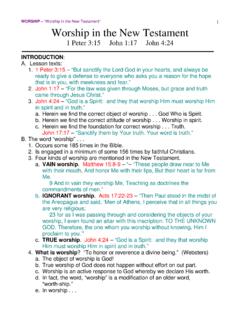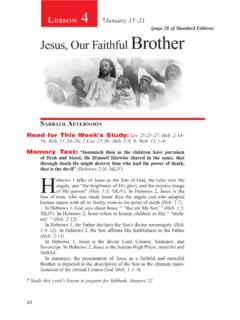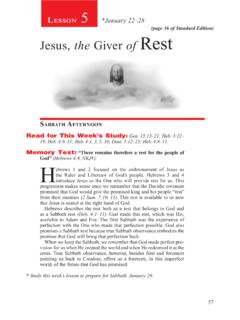Transcription of Systematic Theology A Study of the Primary Doctrines of ...
1 1 Systematic Theology A Study of the Primary Doctrines of the Christian Faith 2 taught by Dr. Garrett Starr at Faith Baptist Church, Kaiserslautern, Germany 3 Table of Contents 1. Prolegomena & the Doctrine of the Word of God (Bibliology - Pt. 1) ..4 2. The Doctrine of the Word of God (Bibliology - Pt. 2) ..10 3. The Doctrine of God ( Theology ) ..16 4. The Doctrine of Christ (Christology) ..29 5. The Doctrine of the Holy Spirit (Pneumatology) ..37 6. The Doctrine of the Trinity ..46 7. The Doctrine of Man (Anthropology) ..52 8.
2 The Doctrine of Sin (Hamartiology) ..58 9. The Doctrine of Salvation (Soteriology) ..68 10. The Doctrine of the Church (Ecclesiology) ..74 This material is summarized from Wayne Grudem s Systematic Theology . Zondervan. Grand Rapids. 1994. 1290 pp. $ 4 5 Faith Baptist Church Systematic Theology : A Study of the Primary Doctrines of the Christian Faith Lesson 1 I. Prolegomena (_____) A. Definition: _____ is the Study of what the entire Bible says about a given topic such as the nature of God, man, sin, redemption, the atonement, justification, etc.
3 Other areas of theological Study are related to Systematic Theology but are different in their scope. For example: 1. _____ asks what Deuteronomy teaches about sin, or what the book of Psalms teaches concerning sin, or what the entire Old Testament teaches about sin. 2. _____ asks what the Gospel of John teaches about prayer, or what the entire New Testament teaches about prayer. 3. _____ asks what specific sections of Scripture or certain biblical authors teach on a given topic, and how that topic developed historically in Scripture.
4 For example, what does 1 John say about the obedience of a true Christian, or what does the Apostle Paul say about the role of women in the church? This sounds very close to Systematic Theology , and indeed these disciplines overlap, but Biblical Theology is concerned with the historical development of a doctrine in Scripture. The difference then between Systematic Theology and these other areas of theological Study is that Systematic Theology focuses on all the relevant biblical passages on a given doctrine to arrive at a proper understanding of what the whole of Scripture teaches on a particular subject.
5 Therefore, Systematic Theology asks what does the entire Bible teach us about prayer, about sin, about salvation, B. Why is it important to Study Systematic Theology ? All our Study of Theology must help us arrive at a right understanding of Who God is, how we are to live in relationship with Him, and how we are to live out this relationship in everyday life. If all of our efforts do not bring us to this place of knowing truth and right living before the Lord, then why bother? Systematic Theology , then, is the Study of God s timeless truth that should transform the way we live our daily lives for His glory.
6 Therefore, we Study Systematic Theology to: 6 1. _____. 2. correctly articulate the Doctrines of orthodox Protestant Christianity. 3. _____. 4. correct any false assumptions or heretical positions that we may currently hold. 5. _____. C. What are the Doctrines that we will examine in our Study of Systematic Theology ? 1. The Doctrine of _____ (Bibliology Parts 1 & 2) 2. The Doctrine of _____ ( Theology ) 3. The Doctrine of _____ (Christology) 4. The Doctrine of _____ (Pneumatology) 5. The Doctrine of the Trinity 6. The Doctrine of _____ (Anthropology) 7.
7 The Doctrine of _____ (Hamartiology) 8. The Doctrine of _____ (Soteriology) 9. The Doctrine of _____ (Ecclesiology) D. Finally, as we begin our Study of Systematic Theology , we will do so with two assumptions, or presuppositions: 1. The Bible is true and is our only absolute standard of truth. 2. The God of Whom the Bible speaks does exist and is absolutely Who the Bible declares Him to be, specifically, the Creator of all things that exist.
8 Important Terms from this Section: 7 Prolegomena Orthodox Old Testament Theology Systematic Theology New Testament Theology Biblical Theology II. The Doctrine of the Word of God (_____) A. Definition: The Word of God is a phrase used in Scripture to denote several different meanings. It is important for us to distinguish between these biblical uses as we begin our Study of this doctrine. 1. The Word of God as _____ a. The Apostle John sees the risen Lord Jesus in Heaven and says, He is clothed with a robe dipped in blood, and His name is called The Word of God.
9 Revelation 19:13, NASB. b. Similarly, the opening of John s Gospel we read, In the beginning was the Word, and the Word was with God, and the Word was God. John 1:1, NASB. It is clear that John is speaking of Jesus Christ because in John 1:14 the apostle states, And the Word became flesh and dwelt among us, full of grace and truth. c. While this usage of calling Jesus the Word is not common in Scripture, it does indicate that among the members of the Trinity, it is God the Son Who in His Person and His Word has the role of communicating the character of God to man.
10 2. The Word of God as _____ a. Examples of God speaking directly to people on earth are found in Scripture. b. God s instruction to Adam demonstrates this personal address: The LORD God commanded the man, saying, From any tree of the garden you may eat freely; but from the tree of the knowledge of good and evil you shall not eat, for in the day that you eat from it you will surely die. " Genesis 2:16-17 c. At the baptism of Jesus by John the Baptist in the Jordan River, God spoke from Heaven: 8 And behold, a voice out of the heavens said, This is My beloved Son, in whom I am well-pleased.



